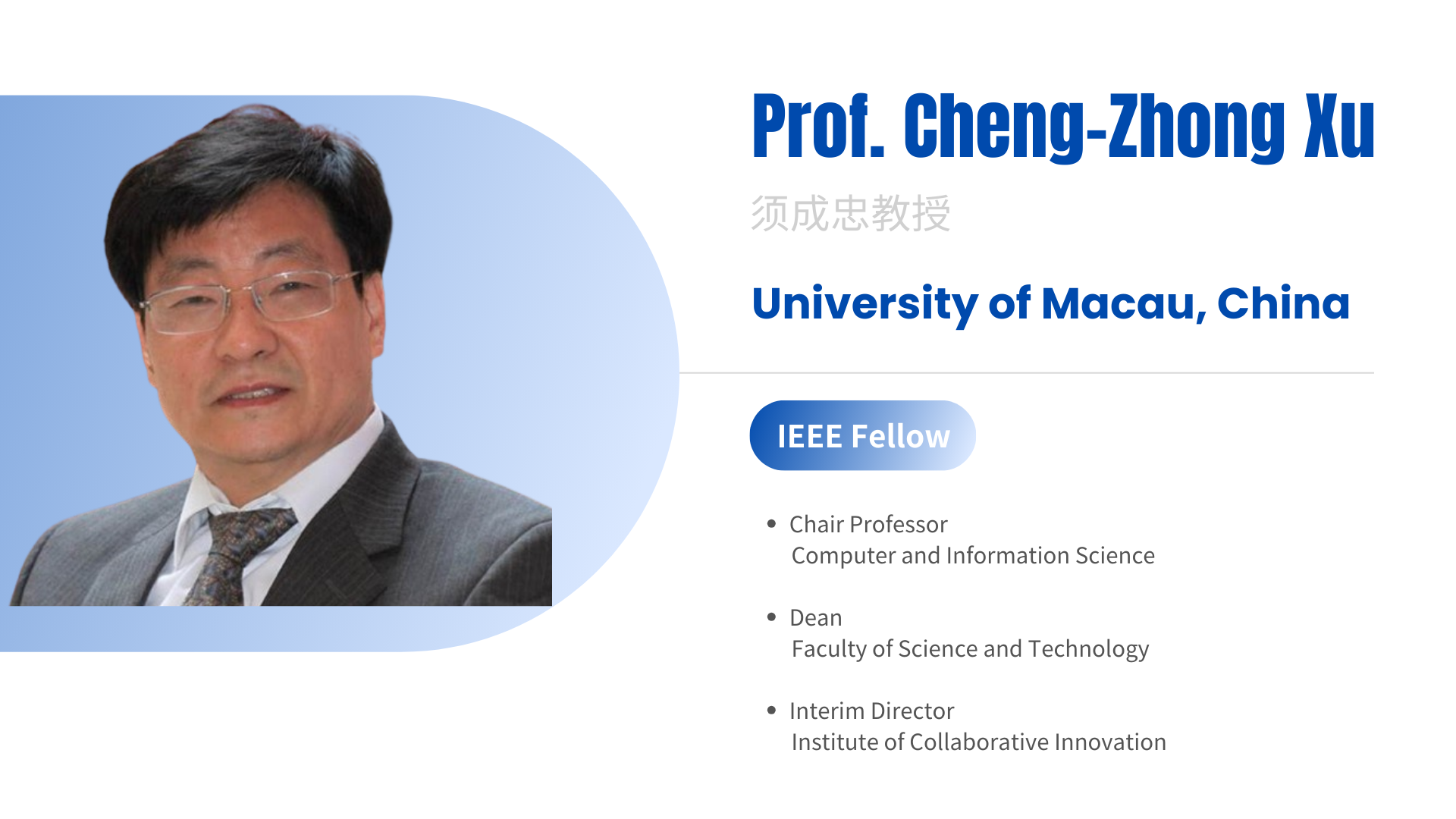


2024 7th International Conference on Computing and Big Data(ICCBD 2024)

Dr. Cheng-Zhong Xu, IEEE Fellow, is the Dean of Faculty of Science and Technology and the Interim Director of Institute of Collaborative Innovation, University of Macau, and a Chair Professor of Computer and Information Science. He was a professor of Wayne State University and the Director of Institute of Advanced Computing of Shenzhen Institutes of Advanced Technology, Chinese Academy of Sciences before he joined UM in 2019. Dr. Xu is a Chief Scientist of Key Project on Smart City of MOST, China and a Principal Investigator of the Key Project on Autonomous Driving of FDCT, Macau SAR. Dr. Xu’s main research interests lie in parallel and distributed computing and cloud computing, in particular, with an emphasis on resource management for system’s performance, reliability, availability, power efficiency, and security, and in big data and data-driven intelligence applications in smart city and self-driving vehicles. The systems of particular interest include distributed systems and the Internet, servers and cloud datacenters, scalable parallel computers, and wireless embedded devices and mobile edge systems. He published two research monographs and more than 300 peer-reviewed papers in journals and conference proceedings. He was a Best Paper Nominee or Awardee of the 2013 IEEE High Performance Computer Architecture (HPCA), the 2013 ACM High Performance Distributed Computing (HPDC), ACM Symposium on Cloud Computing (SoCC’2021), IEEE Cluster’2015, ICPP’2015, GPC’2018, UIC’2018, AIMS’2019, IEEE Edge’2020. He also received more than 100 patents or PCT patents and spun off a business “Shenzhen Baidou Applied Technology” with dedication to location-based services and technologies. Dr. Xu received the most prestigious “President’s Awards for Excellence in Teaching” of Wayne State University in 2002. He serves or served on a number of journal editorial boards, including IEEE Transactions on Computers (TC), IEEE Transactions on Cloud Computing (TCC), IEEE Transactions on Parallel and Distributed Systems (TPDS), Journal of Parallel and Distributed Computing (JPDC), Science China: Information Science and ZTE Communication. Dr. Xu has been the Chair of IEEE Technical Committee on Distributed Processing (TCDP) since 2015. He obtained BSc and MSc degrees from Nanjing University in 1986 and 1989 respectively, and a PhD degree from the University of Hong Kong in 1993, all in Computer Science and Engineering.

Nirwan
Ansari, Distinguished Professor of Electrical and Computer
Engineering at the New Jersey Institute of Technology
(NJIT), holds a Ph.D. from Purdue University, an MSEE from
the University of Michigan, and a BSEE (summa cum laude with
a perfect GPA) from NJIT. He is a Life Fellow of the
Institute of Electrical and Electronics Engineers (IEEE) and
a Fellow of the National Academy of Inventors (NAI).
He authored Green Mobile Networks: A Networking Perspective
(Wiley-IEEE, 2017) with T. Han, and co-authored two other
books. He has also (co-)authored over 700 technical
publications, with more than half of them published in
widely cited journals and magazines. He has served as a
guest editor for numerous special issues on various emerging
topics in communications and networking. Currently, he
serves as the Editor-in-Chief of IEEE Wireless
Communications and has been on the editorial/advisory board
of over ten journals. His current research focuses on green
communications and networking, edge computing,
drone-assisted networking, and various aspects of broadband
networks.
He was elected to serve on the IEEE Communications Society
(ComSoc) Board of Governors as a member-at-large. He has
served as the Director of ComSoc Educational Services Board,
chaired various technical and steering committees within
ComSoc, and has served on many committees such as the IEEE
Fellow Committee. He has actively participated in organizing
numerous IEEE International Conferences/Symposia/Workshops.
Among his many recognitions are several excellence in
teaching awards, multiple best paper awards, the NCE
Excellence in Research Award, several ComSoc TC technical
recognition awards, the NJ Inventors Hall of Fame Inventor
of the Year Award, the Thomas Alva Edison Patent Award, the
Purdue University Outstanding Electrical and Computer
Engineering Award, the NCE 100 Medal, the NJIT Excellence in
Research Prize and Medal, and designation as a COMSOC
Distinguished Lecturer. He has also been granted more than
40 U.S. patents.